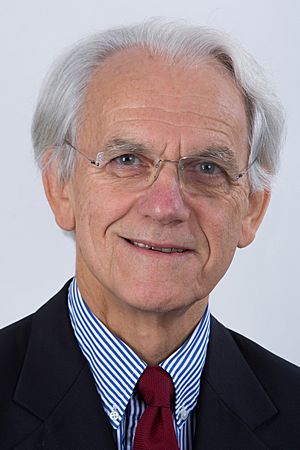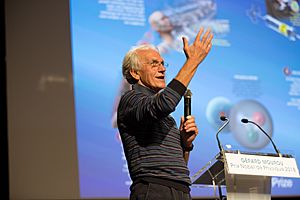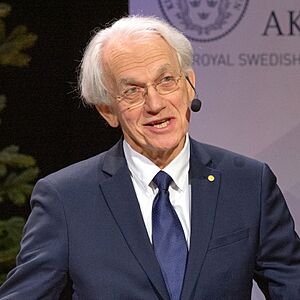Gérard Mourou facts for kids
Quick facts for kids
Gérard Mourou
|
|
|---|---|

Mourou in 2014
|
|
| Born |
Gérard Albert Mourou
22 June 1944 Albertville, Occupied France
|
| Education | University of Grenoble (BSc, MSc) Pierre and Marie Curie University (PhD) |
| Known for | Chirped pulse amplification |
| Awards |
|
| Scientific career | |
| Institutions | École polytechnique ENSTA ParisTech University of Rochester University of Michigan N. I. Lobachevsky State University of Nizhny Novgorod |
| Doctoral students | Donna Strickland |
Gérard Albert Mourou (born June 22, 1944) is a French scientist. He is a pioneer in the field of electrical engineering and lasers. He won the Nobel Prize in Physics in 2018. He shared the prize with Donna Strickland. They won for inventing chirped pulse amplification. This technique helps create very powerful, super-short laser pulses.
In 1994, Mourou and his team made another discovery. They found that powerful laser beams in the air can create "filaments." These filaments act like special tunnels for the laser light. This stops the laser beam from spreading out.
Contents
Gérard Mourou's Career
Gérard Mourou has had a long and important career. He was a director at the Laboratoire d'optique appliquée from 2005 to 2009. He is also a professor at the École Polytechnique. He taught at the University of Michigan for over 16 years.
Early Work and Discoveries
Mourou earned his PhD in 1973. He then moved to the United States. In 1977, he became a professor at the University of Rochester. It was there that he and his student, Donna Strickland, did their Nobel Prize-winning work.
They worked in the Laboratory for Laser Energetics. Together, they invented chirped pulse amplification (CPA). This method creates very strong, super-short bursts of light. Donna Strickland's doctoral thesis was about this new laser technology.
The Extreme Light Infrastructure
In the 2000s, Mourou was part of a video. This video promoted the Extreme Light Infrastructure (ELI). The ELI is a big project. It aims to build the most powerful lasers in the world.
Winning the Nobel Prize

On October 2, 2018, Mourou and Donna Strickland received the Nobel Prize in Physics. They won for their work on chirped pulse amplification. They shared half of the prize. The other half went to Arthur Ashkin. He invented "optical tweezers." These tweezers use laser beams to grab tiny particles.

How Chirped Pulse Amplification Works
Mourou and Strickland found a clever way to make powerful lasers. They stretched out a laser pulse first. This made its power lower. Then, they could amplify it a lot using normal tools. After that, they squeezed the pulse back together. This created the very short, super-powerful lasers they wanted.
This technique is called chirped pulse amplification (CPA). It was described in Donna Strickland's first scientific paper. At the time, they might not have known how important their invention would be.
Impact of CPA
CPA made it possible to study natural events in new ways. It can create a laser pulse that lasts only one attosecond. An attosecond is one-billionth of a billionth of a second. At such tiny timescales, scientists can study chemical reactions. They can even see what happens inside individual atoms.
The work of Strickland and Mourou "paved the way for the shortest, most intense laser beams ever created." These super-short, super-sharp beams are very precise. They are now used in laser machining. Doctors also use them for millions of corrective laser eye surgeries.
Canadian Prime Minister Justin Trudeau praised their achievements. He noted that their work is used in eye surgery. It is also expected to help with cancer therapy and other physics research.
Awards and Honors
Gérard Mourou has received many awards for his work:
- 1995 – R. W. Wood Prize by the OSA
- 1997 – SPIE Harold E. Edgerton Award
- 2002 – National Academy of Engineering Member
- 2004 – IEEE LEOS Quantum Electronics Award
- 2005 – Willis E. Lamb Award for Laser Science and Quantum Optics
- 2009 – Charles Hard Townes Award by the OSA
- 2016 – Frederic Ives Medal
- 2016 – Berthold Leibinger Zukunftspreis
- 2018 – Arthur L. Schawlow Prize in Laser Science by the American Physical Society
- 2018 – Nobel Prize in Physics, with Arthur Ashkin and Donna Strickland
- 2020 – Honorary Doctorate of Vilnius University
- 2020 – Honorary Doctorate of Bulgarian Academy of Sciences
See also
 In Spanish: Gérard Mourou para niños
In Spanish: Gérard Mourou para niños
 | Stephanie Wilson |
 | Charles Bolden |
 | Ronald McNair |
 | Frederick D. Gregory |

